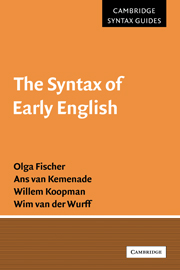Book contents
- Frontmatter
- Contents
- Preface
- List of editions used
- 1 Language change and grammar change
- 2 An outline of Old English syntax
- 3 An outline of Middle English syntax
- 4 The Verb-Second constraint and its loss
- 5 The loss of object–verb word order
- 6 Verb–particles in Old and Middle English
- 7 Changes in infinitival constructions
- 8 The history of the ‘easy-to-please’ construction
- 9 Grammaticalization and grammar change
- References
- Index
Preface
Published online by Cambridge University Press: 23 December 2009
- Frontmatter
- Contents
- Preface
- List of editions used
- 1 Language change and grammar change
- 2 An outline of Old English syntax
- 3 An outline of Middle English syntax
- 4 The Verb-Second constraint and its loss
- 5 The loss of object–verb word order
- 6 Verb–particles in Old and Middle English
- 7 Changes in infinitival constructions
- 8 The history of the ‘easy-to-please’ construction
- 9 Grammaticalization and grammar change
- References
- Index
Summary
In the course of the 1980s and 1990s, historical syntax in general, and English historical syntax in particular, developed into a thriving field of research. Much of the credit for this renaissance must go to the advent of sophisticated models of language variation and of linguistic theory. It is perhaps in the domain of syntax that modern theoretical work has most clearly sharpened the traditional questions of historical linguistics, leading to a surge of novel and interesting insights. Happily, this interest in theoretical questions has gone hand in hand with a continued interest in philological matters and, perhaps even more importantly, the creation of ever larger and more sophisticated computerized databases. For these reasons, it seems a particularly felicitous moment for a textbook to appear in which questions concerning the historical syntax of English are consistently addressed from the perspective of a model of syntactic theory.
The model of syntactic theory adopted in this book is the one known as the Principles and Parameters framework. This has important consequences for the way in which we view historical change. In the Principles and Parameters framework, the focus of investigation is the grammar internalized by the native speaker rather than the language output. Consequently, we will attempt throughout the book to make a distinction between language change and grammar change. In the first chapter, we outline the view of grammar change that we try to establish in the book, and set out our arguments and methodology for making the distinction between language change and grammar change. Chapters 2 and 3 are devoted to descriptive overviews of the most important features of the syntax of Old English and Middle English respectively.
- Type
- Chapter
- Information
- The Syntax of Early English , pp. vii - ixPublisher: Cambridge University PressPrint publication year: 2001
- 1
- Cited by



